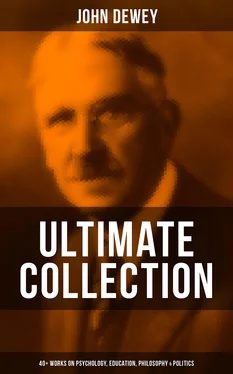In all the higher forms this process cannot be kept up indefinitely. After a while they succumb; they die. The creature is not equal to the task of indefinite self-renewal. But continuity of the life process is not dependent upon the prolongation of the existence of any one individual. Reproduction of other forms of life goes on in continuous sequence. And though, as the geological record shows, not merely individuals but also species die out, the life process continues in increasingly complex forms. As some species die out, forms better adapted to utilize the obstacles against which they struggled in vain come into being. Continuity of life means continual readaptation of the environment to the needs of living organisms.
We have been speaking of life in its lowest terms—as a physical thing. But we use the word "Life" to denote the whole range of experience, individual and racial. When we see a book called the Life of Lincoln we do not expect to find within its covers a treatise on physiology. We look for an account of social antecedents; a description of early surroundings, of the conditions and occupation of the family; of the chief episodes in the development of character; of signal struggles and achievements; of the individual's hopes, tastes, joys and sufferings. In precisely similar fashion we speak of the life of a savage tribe, of the Athenian people, of the American nation. "Life" covers customs, institutions, beliefs, victories and defeats, recreations and occupations.
We employ the word "experience" in the same pregnant sense. And to it, as well as to life in the bare physiological sense, the principle of continuity through renewal applies. With the renewal of physical existence goes, in the case of human beings, the recreation of beliefs, ideals, hopes, happiness, misery, and practices. The continuity of any experience, through renewing of the social group, is a literal fact. Education, in its broadest sense, is the means of this social continuity of life. Every one of the constituent elements of a social group, in a modern city as in a savage tribe, is born immature, helpless, without language, beliefs, ideas, or social standards. Each individual, each unit who is the carrier of the life-experience of his group, in time passes away. Yet the life of the group goes on.
The primary ineluctable facts of the birth and death of each one of the constituent members in a social group determine the necessity of education. On one hand, there is the contrast between the immaturity of the new-born members of the group—its future sole representatives—and the maturity of the adult members who possess the knowledge and customs of the group. On the other hand, there is the necessity that these immature members be not merely physically preserved in adequate numbers, but that they be initiated into the interests, purposes, information, skill, and practices of the mature members: otherwise the group will cease its characteristic life. Even in a savage tribe, the achievements of adults are far beyond what the immature members would be capable of if left to themselves. With the growth of civilization, the gap between the original capacities of the immature and the standards and customs of the elders increases. Mere physical growing up, mere mastery of the bare necessities of subsistence will not suffice to reproduce the life of the group. Deliberate effort and the taking of thoughtful pains are required. Beings who are born not only unaware of, but quite indifferent to, the aims and habits of the social group have to be rendered cognizant of them and actively interested. Education, and education alone, spans the gap.
Society exists through a process of transmission quite as much as biological life. This transmission occurs by means of communication of habits of doing, thinking, and feeling from the older to the younger. Without this communication of ideals, hopes, expectations, standards, opinions, from those members of society who are passing out of the group life to those who are coming into it, social life could not survive. If the members who compose a society lived on continuously, they might educate the new-born members, but it would be a task directed by personal interest rather than social need. Now it is a work of necessity.
If a plague carried off the members of a society all at once, it is obvious that the group would be permanently done for. Yet the death of each of its constituent members is as certain as if an epidemic took them all at once. But the graded difference in age, the fact that some are born as some die, makes possible through transmission of ideas and practices the constant reweaving of the social fabric. Yet this renewal is not automatic. Unless pains are taken to see that genuine and thorough transmission takes place, the most civilized group will relapse into barbarism and then into savagery. In fact, the human young are so immature that if they were left to themselves without the guidance and succor of others, they could not acquire the rudimentary abilities necessary for physical existence. The young of human beings compare so poorly in original efficiency with the young of many of the lower animals, that even the powers needed for physical sustentation have to be acquired under tuition. How much more, then, is this the case with respect to all the technological, artistic, scientific, and moral achievements of humanity!
2. Education and Communication. So obvious, indeed, is the necessity of teaching and learning for the continued existence of a society that we may seem to be dwelling unduly on a truism. But justification is found in the fact that such emphasis is a means of getting us away from an unduly scholastic and formal notion of education. Schools are, indeed, one important method of the transmission which forms the dispositions of the immature; but it is only one means, and, compared with other agencies, a relatively superficial means. Only as we have grasped the necessity of more fundamental and persistent modes of tuition can we make sure of placing the scholastic methods in their true context.
Society not only continues to exist by transmission, by communication, but it may fairly be said to exist in transmission, in communication. There is more than a verbal tie between the words common, community, and communication. Men live in a community in virtue of the things which they have in common; and communication is the way in which they come to possess things in common. What they must have in common in order to form a community or society are aims, beliefs, aspirations, knowledge—a common understanding—like-mindedness as the sociologists say. Such things cannot be passed physically from one to another, like bricks; they cannot be shared as persons would share a pie by dividing it into physical pieces. The communication which insures participation in a common understanding is one which secures similar emotional and intellectual dispositions—like ways of responding to expectations and requirements.
Persons do not become a society by living in physical proximity, any more than a man ceases to be socially influenced by being so many feet or miles removed from others. A book or a letter may institute a more intimate association between human beings separated thousands of miles from each other than exists between dwellers under the same roof. Individuals do not even compose a social group because they all work for a common end. The parts of a machine work with a maximum of cooperativeness for a common result, but they do not form a community. If, however, they were all cognizant of the common end and all interested in it so that they regulated their specific activity in view of it, then they would form a community. But this would involve communication. Each would have to know what the other was about and would have to have some way of keeping the other informed as to his own purpose and progress. Consensus demands communication.
Читать дальше












